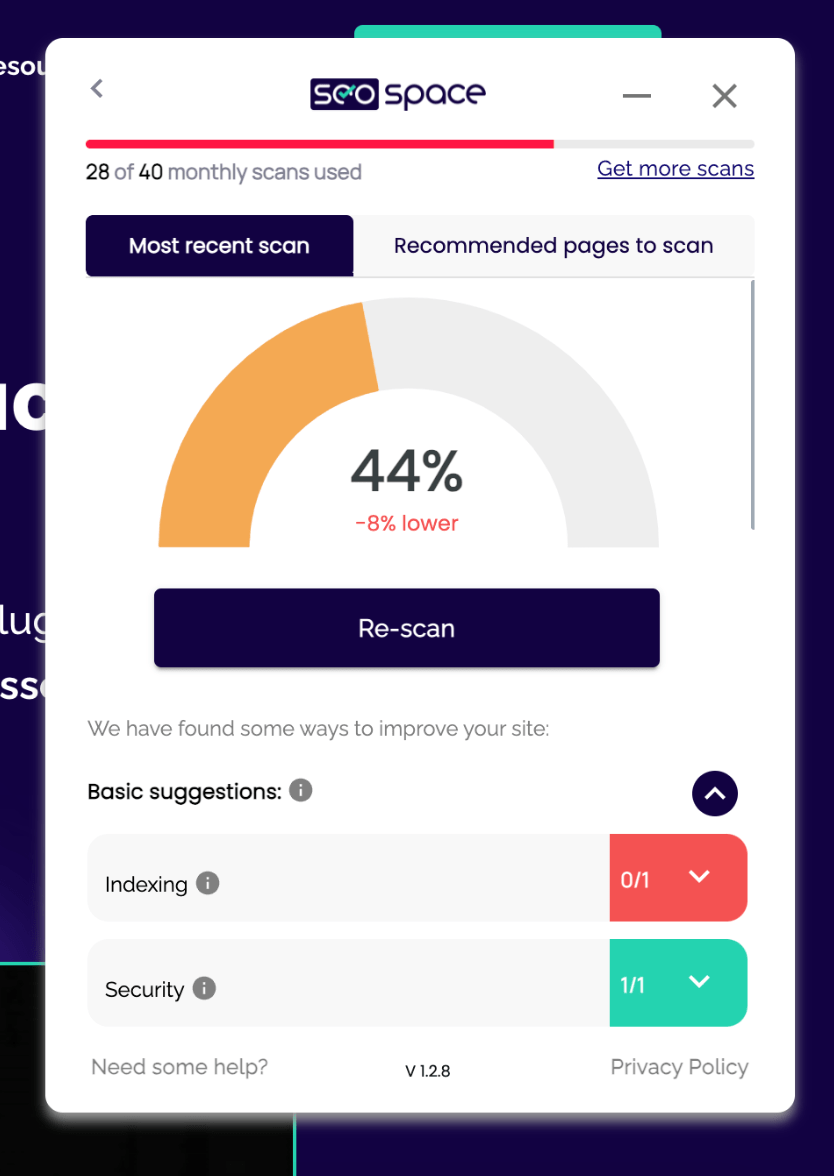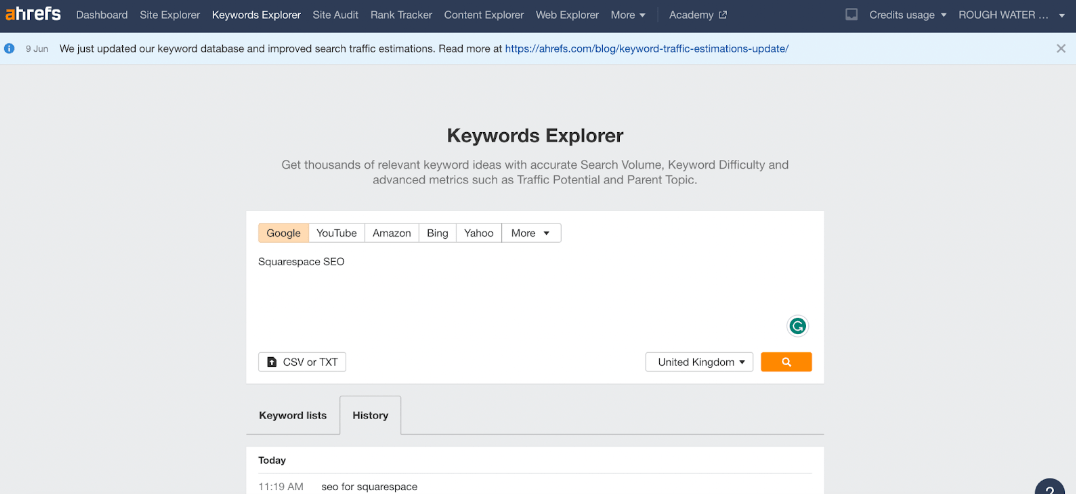How to Do Keyword Research for SEO: Complete 2025 Guide
Do you seek effective keyword research techniques that give your website's SEO an edge over competitors?
In today's digital era, understanding how to do keyword research for SEO is vital for increasing organic traffic and attaining online success. According to research, SEO drives 1000% more organic traffic than social media.
Join us in this comprehensive guide as we share the exact strategies and tools we use when conducting keyword research for a successful search engine optimization campaign. Before proceeding, it might interest you to know that our Squarespace SEO plugin generates relevant keywords and their corresponding search volumes, aiding your keyword research journey.
Short Summary
Keyword research is essential for optimizing SEO performance, as it enables you to identify and prioritize relevant keywords.
Research customer needs and pain points as well as competitor keywords while utilizing keyword research tools to inform an effective SEO strategy.
Monitor existing content and explore new keyword opportunities using free/paid tools like Keywords Everywhere, Ahrefs Keyword Explorer, or Google Keyword Planner.
Optimize and update your pages using on-page tools, such as our SEO plugin for Squarespace.
What is a Keyword?
The language we use when searching for specific products or services greatly impacts digital marketing — this is where keywords come in. Keywords are words and phrases that accurately represent the subject matter of your web page's content, enabling search engines to quickly recognize what they're about and connect with potential customers who might be looking for you.
Why Is Keyword Research Important?
Keyword research is the core of any profitable SEO strategy, forming one of the essential facets of our 12-step Squarespace SEO checklist.
By analyzing what terms people from your target audience type into search engines such as Google, you can identify valuable queries to include in content and make it more likely for pages to show up high on SERPs (search engine results pages). This will then help draw potential customers interested in what goods or services you provide.
When you conduct keyword research, you're basically scouting data regarding query popularity, ranking difficulty, etc. This makes it easier to optimize your website content accurately based on user searches so that your website outranks competitors when users look for related information online.
In fact, what's the point of blogging on Squarespace if you don't know what keywords you should be ranking for?
Think of keyword research acts as navigational guidance when it comes to achieving success with SEO objectives.
Starting Your Keyword Research Journey
To carry out successful keyword research, understanding your customers’ needs and wants, as well as analyzing what keywords competitors use, is crucial. By delving into the minds of your target audience and researching your competitive terrain, you may unveil an abundance of worthwhile keyword opportunities which will aid in boosting your SEO strategy significantly.
Let's jump right into it — exploring each step while uncovering secrets behind effective keyword analysis through the utilization of appropriate tools at hand.
1. Researching Customer Pain Points
To effectively create content that resonates with your customers, it's necessary to understand the difficulties and problems they encounter. Digging into customer feedback, assessing client services connections, taking surveys, and interacting with them via social media platforms, can give you deep insight into what matters most for them.
It also helps shape your keyword research and overall content strategy accordingly. Addressing these concerns not only improves content usability and relevance but also helps build trust among your target audience.
When we started to research for SEOSpace, the first thing we did was interview customers - this is helpful for SEO and for developing your business.
2. Identifying What Target Customers Search
Uncovering what language and topics are of interest is key to crafting content that resonates with your targeted demographic. Collectively analyzing conversations on online groups, forums, and Q&A sites, as well as utilizing customer feedback, can provide invaluable insights into this data.
Understanding the particular terminology used by potential customers and learning more about their interests will help you develop captivating material to drive traffic flow and conversions to your website.
3. Identifying Competitor Keywords
Keyword research can be an incredibly valuable asset to any SEO strategy/campaign. To gain an advantage over competitors, keyword tools such as Ahrefs' Site Explorer can provide insight into which keywords they target that generate the most traffic for their websites.
We also suggest you take advantage of our SEO plugin for Squarespace, which allows you to see those high-ranking keywords specific to your niche alongside their corresponding search volumes.
By having this information and taking advantage of it, businesses will have higher chances of competing in search engine rankings successfully.
Analyzing and Selecting Keywords
Once you have a list of possible key terms, it's time to analyze and pick the best ones for your SEO plan. Doing this involves looking at search volume, assessing keyword complexity, and understanding user intent to prioritize keywords that will generate the highest success rate in the least amount of time. You can then generate content tailored to your desired customers' true needs or wants.
Let's get into more detail on each point.
Considering Search Volume
It's essential to look into monthly search volume when determining keyword priority, as it denotes how often a term is looked up during the month. A Squarespace SEO expert is ideal for finding the right keywords based on their search volumes.
Keywords having high search volume allow you to craft content that appeals to many and hence increase website visits and conversions; however, they can be pretty competitive to rank for.
One of the key Squarespace SEO tips is to niche down and opt for long-tail keywords, which may have lesser search volumes but are more targeted and offer better prospects for ranking.
Utilizing platforms such as SearchVolume.io, the Keywords Everywhere Chrome extension, our SEO plugin for Squarespace, and Google Trends, you may investigate the most frequent search queries from within connected key phrases to mold your content plan accordingly.
Assessing Keyword Difficulty
Keyword difficulty is a gauge that predicts how hard it'll be to rank for any given keyword by analyzing its level of competition. By understanding this metric, you can determine which keywords for which ranking is feasible and avoid wasting effort on those with an overwhelming degree of competitiveness.
Tools such as Keywords Everywhere can help you evaluate keyword difficulty and competition, enabling you to make only sensible decisions around your SEO strategy regarding targeting chosen terms effectively.
Examining User Intent: 4 Types
To properly create content to engage your target audience and boost your SERP rankings, it's important to recognize the search intent of users' queries. There are four primary types:
Informational
Navigational
Transactional
Commercial.
To discern these intentions, you can evaluate top results for a given keyword in a search engine or complete an analysis of SERPs using that exact keyphrase. By accurately using search volumes and matching user inquiries with appropriate material on your website page, you can maximize time spent there, pushing potential customers down the sales funnel faster than ever before!
The image above demonstrates the Keywords Everywhere Chrome extension in use.
Building a Balanced Keyword Strategy: The SEOSpace Pyramid
We can't overemphasize the need for a balanced keyword approach if you seek superb SEO performance. This entails assembling clusters of words (SEOSpace Pyramid), concentrating on long-tail keywords, and focusing on local- as well as query-oriented key phrases.
If you are unsure how to do keyword research for SEO, then the SEOSpace pyramid will help you level up and know what to do once you have your keywords.
Below, we've added a graphic depicting the SEOSpace Pyramid — a framework we devised to make Squarespace SEO easier to digest and structure in a way that generates results.
By executing these approaches, you'll be able to pool together an efficient and comprehensive portfolio of terms that boosts the visibility in SERPs for your website, thus channeling more targeted visitors to it. Now, let's analyze each of these methods in greater detail.
Building Keyword Clusters (The SEOSpace Pyramid)
Using the SEOSpace Pyramid to form keyword clusters effectively boosts your website's authority on a particular subject. This method involves choosing one primary high-volume head keyword and then researching related terms that will help strengthen this central topic — with the ultimate aim of ensuring you're utilizing appropriate keywords for maximum SEO advantages. Doing so not only makes your content more relevant but also allows you to target multiple relevant keywords at once.
Focusing on Long-Tail Keywords (To Begin With)
We previously mentioned why it's advisable to focus on long-tail keywords, especially if you're just starting off your website. We'll be discussing it at greater lengths here.
Long-tail keywords are basically search terms comprising three or more words focusing on niche markets. As such, they can assist in differentiating your website and driving targeted visitors who search for these particular phrases. For example, if the primary keyword is "SEO agency," long-tail keywords could be "best SEO agency," "best SEO agency for Squarespace," etc.
Once again, Keywords Everywhere is a very helpful tool for finding long-tail keywords. When you search a term, the long tail related keywords are generated and shown with their search volume and competition.
Implementing a successful SEO strategy that uses these longer tail keywords at inception allows you to target topics tailored to your particular audience while concurrently increasing your presence in online searches over time. Additionally, by initially utilizing long-tail terms, you may subsequently rank for head terms/keywords after becoming established later in your SEO journey.
Targeting Local and Question-Based Keywords
Consider focusing on local and question-based keywords to increase your website's visibility in search engine results. This technique could involve adding a specific location term into the text or formulating sentences as questions that are relevant to the user experience.
For example, "Where can I find the best Squarespace designers in London?" or "Is starting a real estate agency in Liverpool profitable?"
Optimizing for both types will give visitors more comprehensive resources for those topics with scarce info online while improving SEO performance simultaneously. Hence, you must not overlook crafting an effective keyword strategy that incorporates these two elements when aiming at higher rankings!
Monitoring and Improving Your Keyword Performance
Keeping track of keyword rankings, refining your content regularly, and discovering new terms are all essential to guarantee that your website stays competitive in today's search engine optimization (SEO) landscape. You can use the Ahrefs Rank Tracker to track your keywords.
By following a systemized approach which includes tracking where specific keywords stand within SERPs regularly, adjusting pre-existing materials as needed, and identifying alternative key phrases, you can keep your web pages up-to-date while staying ahead of the competition.
The best way to track how your keywords are doing, both in terms of ranking and the impressions and clicks they get is via Google Search Console - this is completely free, as we’ll explain in detail below. You can’t know how to do keyword research for SEO without Google Search Console!
To ensure you get the most out of these techniques and maintain an optimal keyword performance over time, let's explore how you can monitor your SEO progress.
Tracking Keyword Rankings
Monitoring your keyword ranking is key for understanding the reach of your content through search engine results and spotting potential areas that need improvement. Utilizing Google Search Console (GSC), you can keep an eye on how those keywords are performing in terms of website performance based on specific queries. See how to set up GSC for your website in the below video.
By vigilantly tracking where specific words stand within searches, it's possible to decide which ones should be targeted more and create optimized material to reap greater SEO success.
Refreshing and Updating Existing Content (Using SEOSpace)
It's vital to keep your keyword performance up-to-date by refreshing and updating existing content. With tools like the Squarespace SEO plugin from SEOSpace, it becomes easy to identify content that requires an update with relevant information.
For example, you can fix hard-to-read URLs, update content with more recent info and trends, ensure proper meta descriptions, fix broken links, optimize images and videos, etc., some of which may help boost your Squarespace website load speed. Doing this helps you stay in sync with the user trends and industry demands and allows you to target different keywords, enhancing SEO results.
Exploring New Keyword Opportunities
By frequently utilizing tools such as our Squarespace SEO plugin and Ahrefs Keywords Explorer, you can keep up with the evolving SEO climate and uncover keyword ideas that may have gone unnoticed. These fresh opportunities will help your website stay relevant to attract more visitors and conversions.
Consistently staying alert for new keywords is key to ensuring your site remains competitive amid all of the changes happening in the search engine optimization world.
Utilizing Free and Paid Keyword Research Tools
For keyword research, various free and paid tools exist, which are useful in understanding essential data like search volume, difficulty level of the target keywords, as well as user intent. With such information on hand, you could design your SEO strategy more productively for better performance.
Let's look at some noteworthy options available today that you can utilize.
Google Keyword Planner
Google Keyword Planner is an invaluable resource for keyword research, as it provides a range of helpful data that can be used to create seed keywords and discover relevant suggestions. While its results tend to lean more towards ads than organic search, this free tool remains essential in starting your journey to understand how users search online.
The insights provided by Google's Keyword Planner can give both website owners and SEO professionals ample opportunity to gain knowledge and insight into potential topics related to their fields.
Ahrefs Keywords Explorer
Ahrefs Keywords Explorer is a robust keyword research tool that provides users with comprehensive and in-depth search engine suggestions, including detailed information on the associated search volume data for seed keywords as well as an estimation of their difficulty score.
By utilizing its impressive database and easy-to-navigate interface, SEO professionals can discover viable keywords for their sites while accessing real-time insights into trends and competition.
The Keywords Explorer tool by Ahrefs has all sorts of features designed to make locating the most profitable terms effortless. From collecting proper and relevant keyword ideas to providing up-to-date data regarding search queries made across different search engines alongside their corresponding difficulties, it allows you to optimize your strategy to the finest detail.
Note: Ahrefs is very expensive, and it’s not worth investing in unless you are seriously looking to push cash behind your SEO efforts.
Other Notable Tools
Apart from the options discussed above, tools such as SEMrush, Moz Keyword Explorer, and Wordtracker offer a range of features that could be advantageous in any keyword analysis project. By using different keyword research tools simultaneously, you can make sure that any important information about potential targeted terms doesn't slip through the net!
Frequently Asked Questions about Keyword Research
How to do keyword research for SEO?
For successful SEO, keyword research is essential, and here’s a step-by-step outline to help you out.
List down topics of interest and relevant keywords that come to mind — this will form the foundation for your search.
Take advantage of Google's Autocomplete suggestions as they provide insight into what people are actually searching online.
Use the Google Keyword Planner tool to evaluate competitors’ key phrases being used in their content marketing strategies.
Conduct an audit on all collected data before analyzing it to ensure maximum benefit from your efforts in optimizing website visibility through an effective keyword usage strategy.
How can I do keyword research like the SEO pros?
Getting to the level of a professional SEO entails conducting an efficient keyword research process. Begin with the creative thinking of more keyword ideas, then choose apt keyphrase resources and form your keyword cluster. Afterwards, set up reference points and plot out your strategy.
How long should SEO keyword research take?
Researching SEO keywords for the best strategy should take 10–14 days to guarantee optimal traffic. This research needs to consider trends, industry language, and competitor approaches to accomplish successful keyword targeting. By doing so, you can generate a complete keyword plan that promises powerful search results specifically for your site.
What is keyword research with an example?
Keyword research is an activity that seeks to understand the words and phrases consumers use when searching for data or items online. For instance, if one were looking for pet food, they might enter “dog food” into a search engine. You can research which keywords your customers are likely to use and optimize your site for those keywords, increasing the traffic driven to your site.
By researching these search terms, businesses can more accurately adjust their digital marketing methods.
Keyword Research Conclusion
The role of excellent keyword research in any SEO campaign can't be overemphasized. When you familiarize yourself with the fundamentals, you can unlock your SEO campaign’s maximum potential. Don't forget to use any free or paid tools available to monitor and optimize your performance related to these words — an excellent example is our innovative Squarespace SEO plugin.
And if you're unsure of where to begin, how about kicking off with a free SEO audit of your website from us to help you unveil potential loopholes? Also, get enrolled in our Squarespace SEO course and training to get deeper into SEO and Keyword Research.









